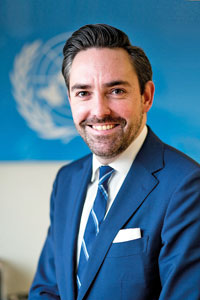Sunday Times 2
Beyond COP29: Unlocking climate finance for Lanka
View(s):- By Marc-André Franche, United Nations Resident Coordinator in Sri Lanka, exclusive to the Sunday Times

This year will be the hottest year on record, which means the climate crisis is no longer a threat but a harsh reality. Global greenhouse gas emissions have reached unprecedented levels, driving extreme weather events and disasters. Glaciers are melting at alarming rates, sea-level rise and ocean heating are accelerating, and extreme weather is now the norm.
Sri Lanka, despite contributing only a fraction to global emissions, remains severely affected. Rising sea levels, floods, landslides, and prolonged droughts threaten livelihoods, food production, and the national economy. This year alone, severe floods caused notable destruction, affecting people across multiple districts.
Time is running out to reverse this trajectory, which is why the 29th Conference of the Parties (COP29) of the United Nations Framework Convention on Climate Change, which ended on Friday in Baku, was so important. The annual meeting allows countries to assess global climate challenges, negotiate emission reduction targets, and discuss adaptation measures to tackle climate impacts.
This year negotiations reached a pivotal point, particularly around the hesitancy of wealthier nations—the largest historical emitters of greenhouse gases—to commit to substantial financial contributions. A central focus was the New Collective Quantified Goal on Climate Finance, aimed at mobilizing $1 trillion a year, split between adaptation, the Loss-and-Damage Fund, and a public finance component. The final number will probably be much lower, possibly a third.
This said, funding the Loss-and-Damage Fund will help address both immediate effects, such as infrastructure damage and community displacement after disasters, and slow onset climate impacts. Another key development at COP29 was the approval of standards to strengthen the global carbon market through the Paris Agreement crediting mechanism. This framework supports verifiable emission reduction projects, attracts funding, and fosters international cooperation.
To benefit from these global climate finance mechanisms, Sri Lanka will need to act proactively on a number of important fronts. First, the county needs to update its plan or its Nationally Determined Contributions (NDCs) under the Paris Agreement. Strong and clear NDCs are not only a climate adaptation tool but also a key driver of growth, which is critical for the country’s recovery. The NDCs include priority targets across the economy to guide priority projects that will stimulate access to external funding. Then, the country needs a portfolio of projects that are not only well-designed but also the results of extensive consultations, so that there is a strong consensus on priority investments targeting the right funding instrument.
On that basis, Sri Lanka must continue to maximise its access to existing funds, such as the Green Climate Fund or the Global Environment Facility, but also new mechanisms such as the Loss-and-Damage Fund. Beyond addressing damages, access to this funding will enable the country to invest in long-term mitigation and adaptation strategies, protecting its communities, infrastructure, and ecosystems. Additionally, mechanisms to improve planning and budgeting, like the Integrated National Financing Framework, will improve targeting and the effectiveness of financing.
Sri Lanka can also benefit from the global carbon market aimed at strengthening international cooperation around emission reduction. By enhancing its regulatory frameworks, establishing clear carbon pricing rules, and focusing on carbon-credit-generating initiatives in renewable energy, energy efficiency, and reforestation, the country can unlock new revenue streams to fund its climate adaptation and mitigation efforts while promoting sustainable economic growth. Investments in renewable energy are particularly critical in this effort. With abundant solar and wind resources, Sri Lanka is well-positioned to transition to clean energy, reducing reliance on costly fossil fuels and cutting greenhouse gas emissions.
Finally, Sri Lanka must ensure its active participation in global climate discussions. Being present and vocal in these negotiations with strong levels of representation allows the country to advocate for the implementation of sustainable climate finance and ensure technical support aligns with its development goals. By investing in climate diplomacy and crafting a strong presence in international forums, Sri Lanka can position itself as a leader in the global climate agenda and secure the resources necessary to advance its goals.
The United Nations is committed to supporting the Government to advance both climate adaptation and mitigation efforts. This includes initiatives on environmental management, climate-smart agriculture, electric vehicle mobility, and providing technical assistance for renewable energy projects, to name a few. The United Nations also works to support disaster preparedness and post-disaster recovery initiatives. We will continue to provide technical support to the Government to update the country’s NDCs while rallying Sri Lanka partners.
As the UN Secretary-General has said, 2024 has been a masterclass in climate destruction. We now find ourselves in the final countdown to limit global temperature rise, and it’s time to deliver.

